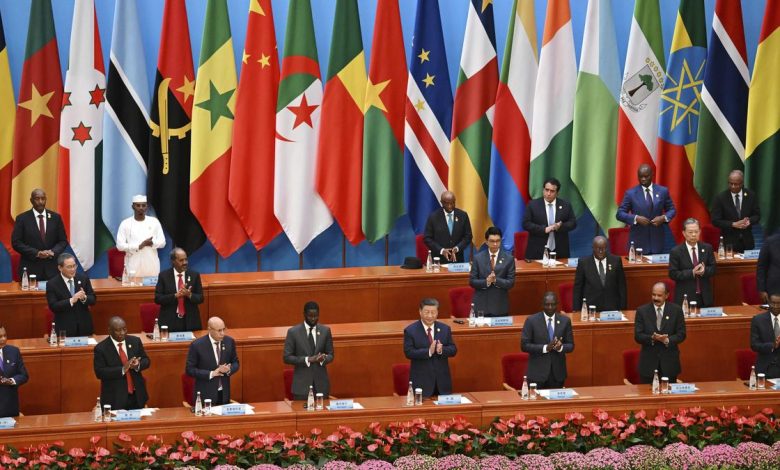
By Edson Baraukwa | Africa Guardian
The recently concluded 2024 Summit of the Forum on China-Africa Cooperation (FOCAC) in Beijing, chaired by African Heads of State and delegations from across the continent, was hailed as a success. Chinese President Xi Jinping called it a “stellar example,” highlighting the progress made during the summit.
President Xi committed to implementing ten partnership actions over the next three years to modernize and deepen China-Africa cooperation. These actions focus on mutual learning among civilizations, trade prosperity, industrial chain cooperation, connectivity, development cooperation, health, agriculture, livelihoods, cultural exchanges, green development, and common security.
Chinese Foreign Minister Wang Yi emphasized that the bilateral relations between China and African countries have now been elevated to a strategic level. This partnership is built on mutual respect, equality, and win-win cooperation, providing a platform for African countries and China to exchange ideas, forge agreements, and enhance economic cooperation for sustainable development.
Key Principles of China-Africa Relations
During the summit, President Xi reaffirmed China’s “Five Nos” policy towards African and other developing countries:
- No interference in how African countries choose their development paths.
- No interference in internal affairs.
- No imposition of China’s will.
- No political strings attached to assistance.
- No pursuit of selfish political gains in investments and financing.
This approach reinforces China’s commitment to genuine support and partnership with Africa.
Evolution of the FOCAC Partnership
Since its inception in 2000, FOCAC has served as a multilateral partnership platform between China and 53 African states (excluding Eswatini, which maintains diplomatic relations with Taiwan). The partnership has evolved to address global challenges such as health, sustainable development, and universal health coverage.
African countries are encouraged to learn from China’s significant health diplomacy, which emphasizes health financing, commitment, and investment to improve efficiency, value, and health planning priorities. Observers like Fall and Gakosso see the cooperation as transformative for Africa, with a shared vision for development and prosperity.
Opportunities and Insights from the Summit
Experts like Mwangi Wachira, a former World Bank economist, foresee expanded supply chains and industrial cooperation between Africa and China. He envisions a future where collaboration between Chinese and African entrepreneurs and governments leads to the production of consumer goods for Africa’s growing middle class.
Zhang Shaogang, deputy director of the China Council for the Promotion of International Trade, noted the strong complementarities between China and Africa’s industrial and supply chains, especially in emerging fields like the digital economy, green development, and artificial intelligence. Janson Huang, chairman of the Sino-Tanzania Industrial Park, highlighted the potential economic benefits of deeper integration of these chains, which could reduce logistics costs, increase trade efficiency, and promote African products globally.
Tchicaya Nebert Gilmart Bienvenu, a Congolese official, stressed that leveraging China’s experience in manufacturing and technology could significantly enhance Africa’s industrialization and production capacity. Other analysts, like Novatus Igosha, see the summit as an opportunity to market African products and attract foreign investment, particularly in infrastructure development.
Strategic Benefits of China-Africa Cooperation
Alan Khan, senior director at Durban University of Technology, highlighted the importance of the FOCAC summit in addressing Africa’s infrastructure funding gap, estimated at $130-170 billion annually by the African Development Bank. He emphasized that China is Africa’s largest trading partner, making their partnership vital for both sides.
The summit is expected to foster cooperation in various sectors such as education, healthcare, infrastructure, and technology. It aims to drive sustainable development and mutual growth through concrete commitments and action plans.
Strengthening Infrastructure and Connectivity
With the African continent striving to enhance intra-Africa trade, the FOCAC summit is likely to prioritize infrastructure development to improve connectivity within Africa and between Africa and China. This connectivity is seen as a key driver of economic growth and is integral to the Belt and Road Initiative (BRI), which includes the participation of 44 sub-Saharan African countries.
Focus on Sustainable Development and Collaboration
The summit is also expected to promote educational exchanges, research collaborations, and people-to-people connections, which will contribute to skills development and innovation across Africa. In addition, there will be a focus on healthcare, green technologies, and other areas essential for fostering long-term sustainable growth.
Khan pointed out the significant investments in infrastructure, healthcare, and disease control facilitated by FOCAC, which have improved trade, mobility, and health capacities in many African countries. He anticipates more projects that align with environmental sustainability goals to mitigate climate change impacts in Africa.
Building a Shared Future
Under the theme “Joining Hands to Advance Modernization and Build a High-Level China-Africa Community with a Shared Future,” the summit explored ways to strengthen solidarity and cooperation between China and Africa. As FOCAC approaches its 25th anniversary, it has evolved into a crucial platform for collective dialogue and practical cooperation built on friendship, respect, trust, and mutual benefit.
Leaders and analysts from across Africa, such as Oliver Bulaya from Zambia, hope for future cooperation to focus on sustainable and inclusive development, addressing local environmental and social challenges. Musalia Mudavadi, Kenya’s Prime Cabinet Secretary, and other African diplomats have expressed optimism about further deepening ties and exploring new opportunities for cooperation.
Conclusion
The FOCAC summit continues to be a vital forum for reinforcing China-Africa relations, fostering economic growth, and promoting sustainable development. With China’s ongoing commitment and support, Africa is poised to achieve greater modernization, connectivity, and mutual prosperity.
___
